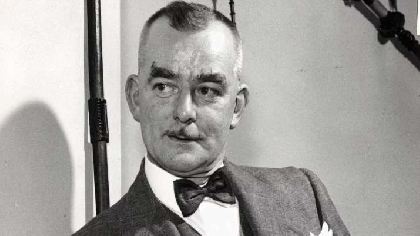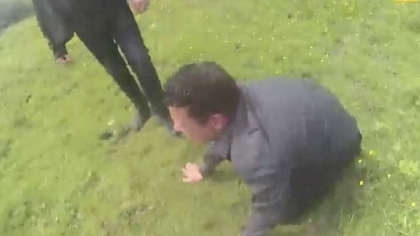
Apart from the regulars, few visitors to Harry Allen’s pub could imagine the macabre secret of the dapper bow-tied man pulling them a pint.
Allen had been in the pub trade for years, but has become infamous over the decades for his ‘part-time’ work as one of England’s last hangmen.
Born in West Yorkshire, Allen worked alongside the notorious Albert Pierrepoint, executing prisoners at Manchester’s Strangeways prison and jails throughout the UK.
Starting his career by hanging German prisoners of war convicted of murdering a comrade, Allen’s most high profile execution was that of James Hanratty.
Hanratty, also known as the A6 Murderer, was one of the final eight people in the UK to be executed before the death sentence was effectively abolished.
Doubts over his conviction for murder in 1962 have been expressed ever since.
Born in West Yorkshire in 1911, Allen was raised and educated in Ashton.
He was educated at St Anne’s Roman Catholic School in Burlington Street, Ashton.
His first job was in the Transport Department at Park Bridge Iron Works, before he became a bus driver with Ashton Corporation, a job he continued to hold after he became an assistant hangman in 1941.
While his young pals may have dreamed of playing football for United or City, young Harry harboured a childhood ambition to become a hangman.
He applied for a job in the Prison Service in the 1930s but was turned down.
However, the rejection did not quell his ambitions.
He successfully applied to be put on the Home Office list of executioners and was often employed as an assistant executioner to Tom Pierrepoint, the uncle of Albert Pierrepoint.
He witnessed his first execution at the age of 29 – that of William Cooper – on 26 November 1940 at Bedford Prison, describing it as a “very good, clean job, not as gruesome as I expected”
About this time he became the landlord of a pub in Farnworth, Lancashire, combining his role as executioner with serving pints.
He ran the pub until the early 1950s when he took over another, the Junction Inn, on Higher Lane in Whitefield.
In 1945, five German prisoners of war were hanged for murdering a fellow German soldier, Sergeant-Major Wolfgang Rosterg, whom they suspected of having betrayed their escape plan.
Afterwards Allen wrote: “It was a foul murder. They staged a mock trial, kicking the victim to death and dragging him by the neck to the toilet where they hung his lifeless body on a waste pipe.
“These five prisoners are the most callous men I have ever met so far but I blame the Nazi doctrine for that. It must be a terrible creed.”
A 21-year-old, Erich Palme-König, was the first of the soldiers to be hanged at Pentonville Prison, swearing allegiance to the last to Nazi Germany.
On January 28, 1953, Allen assisted at the controversial execution of Derek Bentley, who was hanged for a murder committed by a friend and accomplice during an attempted robbery, and for which Bentley received a posthumous pardon 45 years later.
Allen was not present at the execution of Ruth Ellis, the last woman to be hanged in the UK, in 1955: the assistant to Albert Pierrepoint on that occasion was Royston Rickard.
Following the resignation of Albert Pierrepoint Allen and Robert Leslie Stewart jointly became Chief Executioners. However, the Homicide Act 1957 reduced the number of condemned criminals by three quarters from an average of 15 a year in the early 1950s to about four a year later in the decade.
As Chief Executioner, on July 11, 1958, Allen hanged American-born Scottish serial killer Peter Manuel at Barlinnie prison, Glasgow.
He also hanged Guenther Podola on bonfire night 1959, a German-born petty thief, and the last man to be hanged in the UK for killing a police officer.
Allen performed the last execution in Northern Ireland in December 1961, when he hanged Robert McGladdery at Crumlin Road Gaol in Belfast. He also performed the last hanging in Scotland, when Henry Burnett was hanged at Craiginches Prison in Aberdeen on August 15, 1963, for the murder of Thomas Guyan.
He hanged Russell Pascoe, one of the third-last prisoners to be hanged in a British prison, at Bristol’s Horfield Prison on December 17, in the same year. He also performed one of the two final executions in the UK, when at 8.00 am on August 13, 1964, Gwynne Owen Evans was hanged at Strangeways Prison in Manchester for the murder of John Alan West. This occurred simultaneously with the execution of Evans’s accomplice Peter Anthony Allen, who was hanged at Walton Gaol in Liverpool by Robert Leslie Stewart.
Serving behind the bar at his pub, Allen was famous for his dapper appearance.
He carried this aspect of his character over to his job as an executioner.
He always wore a bowtie when hanging a convicted man, something he described as ‘a mark of respect’.
He said: “I never felt a moment’s remorse and always slept peacefully on the nights before and after a hanging.”
However, Allen’s career was coming to an end.
High profile miscarriages of justice had weakened the public’s appetite for the death sentence.
In October 2008 it was revealed that Allen had kept a diary which included a precise log of the prisoners and how they died. He recorded each prisoner’s age, weight, height and calculations for the length of rope needed to hang them.
He describef hanging as a “swift and humane” business.
He boasted that one of his executions could take just 30 seconds from the time he entered the condemned prisoner’s cell to the final drop which ended their life.
Under the Murder (Abolition of Death Penalty) Act 1965, capital punishment in Great Britain for murder was suspended, before finally being abolished in 1969 (it was abolished in 1973 in Northern Ireland). Although the death penalty remained for other crimes such as treason and piracy with violence, no further executions took place in the UK, although a working gallows was kept in service and regularly tested at Wandsworth Prison until 1998.
Allen worked for a few years in security at an engineering firm in Blackburn bfore moving to Fleetwood with his wife Doris in 1977, to escape the continued publicity.
He worked as a cashier at Fleetwood Pier, a mundane final act to an extraordinary life.
He died in Agust1992, just a month after his mentor Albert Pierrepoint, who had died in Southport.


 Pentecost in the Park: Stalybridge churches celebrate this Sunday
Pentecost in the Park: Stalybridge churches celebrate this Sunday
 Illegal vapes worth £30k seized in multi-agency crackdown
Illegal vapes worth £30k seized in multi-agency crackdown
 Dukinfield ex-cop jailed for sexual assault of young girls as they slept
Dukinfield ex-cop jailed for sexual assault of young girls as they slept
 WATCH: Police chase prolific burglar through Denton farmer's field
WATCH: Police chase prolific burglar through Denton farmer's field


